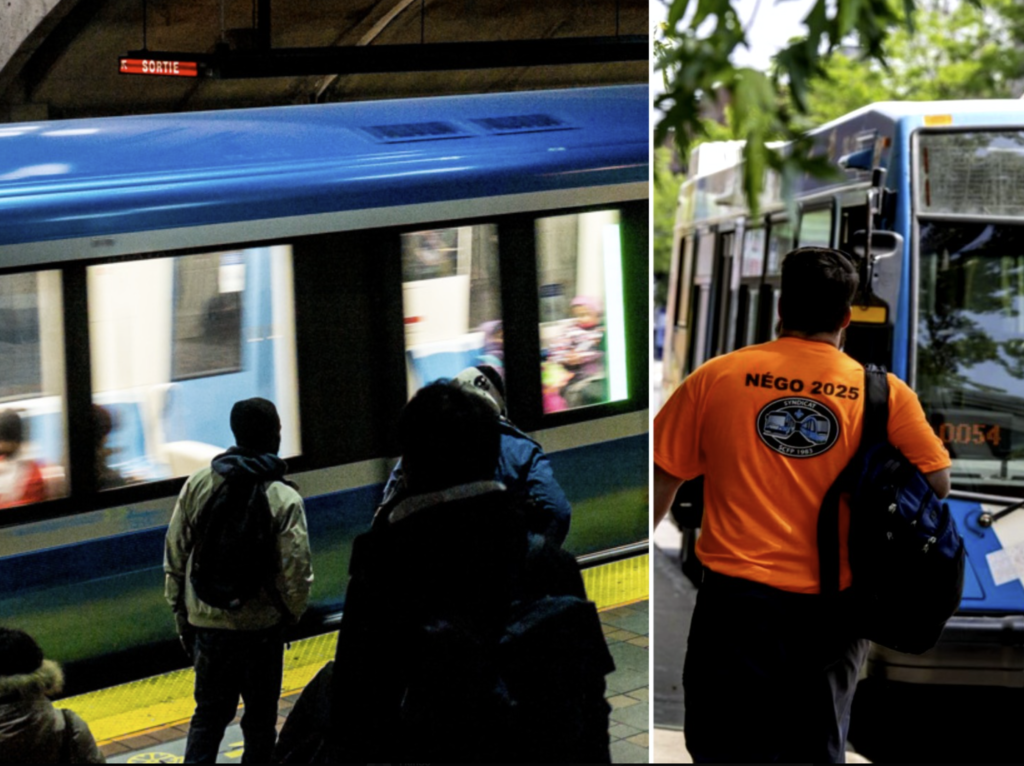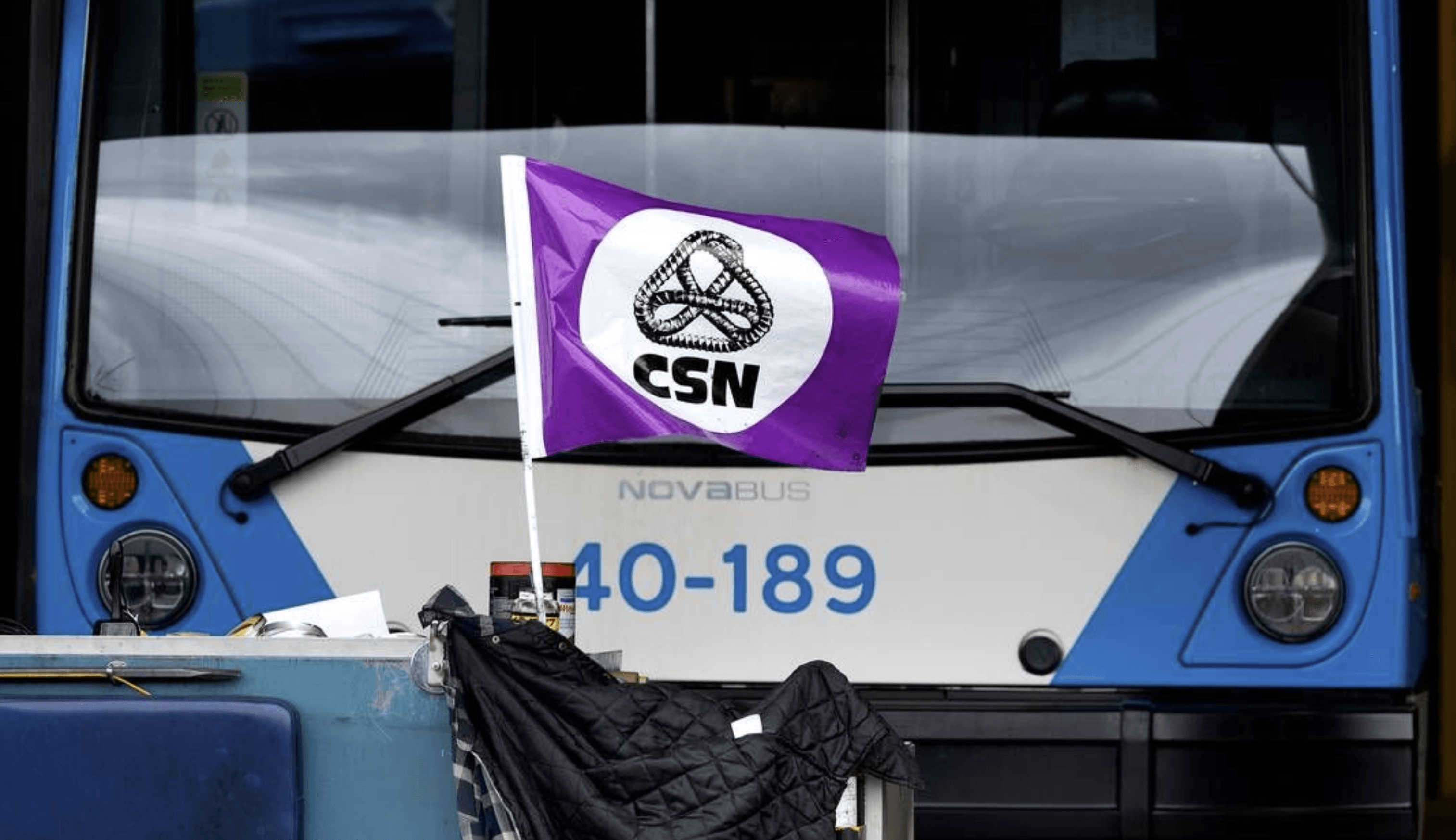On strike since yesterday morning, Société de transport de Montréal (STM) maintenance workers are refusing to watch the service they provide to the public be dismantled. Staff cuts, service reductions, and privatizations began a few years ago, but are now accelerating. Bruno Jeannotte, president of the striking union, says his members won’t back down.
The maintenance division of the transit agency includes over 50 trades (electricians, plumbers, mechanics, cleaners, etc.). The strike that began Monday morning will seriously disrupt metro and bus schedules. Details on these disruptions can be found on the STM website.
Worse jobs, worse service
Jeannotte told The North Star that the STM wants to remove from the collective agreement clauses that prevent outsourcing and privatization, as well as clauses protecting job security. “If we give up on those two points, it’ll be critical.”
On one hand, there’s job security. The STM is currently required to relocate employees when a service is shut down. Jeannotte explains that outsourcing reduces the necessary workforce, creating a surplus of employees. To be able to lay them off more easily, the STM wants to eliminate those protective clauses.
On the other hand, there’s service quality. “If we go the outsourcing route, we’re tied to the lowest bidder. The lowest bidder will submit a ridiculously low offer, we’ll get rid of our equipment, and then prices will go up, things will spiral out of control, and it’ll end up costing more.”
“In the end, we’ll have a less optimal service. And then it’s the whole population that’s going to be paralyzed. That’s a lot more damaging than a few days of interrupted service due to a strike.”
Concerns about paratransit
“This already happened in the early 2000s, when we outsourced part of the bus maintenance. After a few months, the SAAQ grounded a third of the fleet for safety reasons. That’s 500 out of 1,500 buses that stopped running overnight.”
That’s why they are so opposed to the privatization of paratransit, which was announced in February. “The moment there’s no profit to be made, vehicle maintenance gets neglected.”
He gives the example of wheelchair ramps, which are easily damaged. If they stop working, paratransit users are forced to rely on taxis, which are more expensive and not adapted to their needs. “It’s nothing like the quality of service we were able to provide.”

When the privatization was announced, the STM justified it with terms like “streamline services,” “innovate,” “enhance our service offering,” or “reevaluate our business model.” But in the last paragraph of the press release, the STM made its real motives clear:
“This initiative could generate recurring savings of $15 million [...] it will contribute to the transit agency’s goal of reducing expenses by $100 million over the next five years.” The reason: the CAQ government is putting enormous pressure on STM to cut its spending.
“We’re seeing the rise of privatization in health care, in education, and everywhere else,” Jeannotte says. “It feels like they’re poisoning public systems right now, making them dysfunctional and expensive.”
But maintenance workers don’t want to go down that road. “We have our own mechanics, our own building crews, our own transportation centres. We’re working to keep this ours. It’s a public corporation,” which, according to him, should belong to the people. “I hope the public will stand with us to keep it ours.”
The right to strike under question
Maintenance workers had already tried to go on strike at the end of May. Since their work is considered essential, they had to submit a plan to the Administrative Labour Tribunal (TAT) outlining how minimum service levels would be maintained. But their proposal was rejected… allegedly because it could have caused gatherings of aggressive individuals.
Jeannotte wishes they had been able to try the plan they submitted. “It would’ve had less of an impact than what we did today, and we could’ve gotten our message across that way, but the tribunal decided otherwise.”
He questions the reasoning behind the tribunal’s decision. He views the assaults against STM workers as the symptom of a sick society that neglects its most vulnerable. “There were plenty of assaults in the metro over the winter—people experiencing homelessness, people involved in drug use, and so on. Would having buses but no metro really have amplified that? We don’t think so.”
All this while negotiations with their employer are far from over. “We haven’t even started talking about wages yet,” Jeannotte points out. “If the STM keeps digging in its heels, if we keep hearing the same message at all the bargaining tables—outsourcing, layoffs... then people should expect more strikes, and maybe even a pretty stormy fall.”


